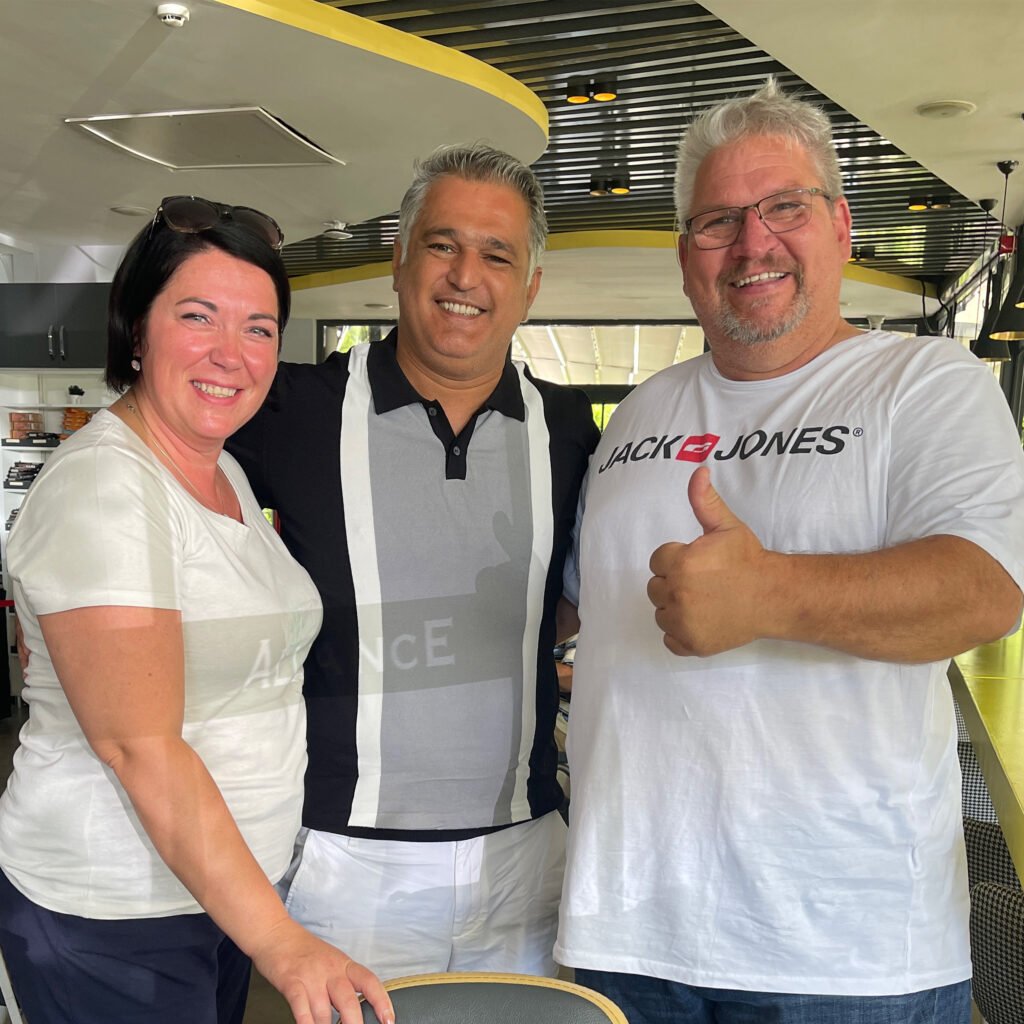Why does Diarrhoea after gastric sleeve surgery?
The gastric sleeve surgery is an alternative to the gastric bypass and is also used for severe obesity. In this procedure, a large portion of the stomach is removed, leaving it as a tube-shaped reservoir.
Diarrhoea may occur after surgery as the body adjusts to altered food intake. Restricting food intake results in less fat and fibre being consumed, which can affect bowel movements. However, this effect should subside after a few weeks as the body gets used to the new situation.
According to a study by the German Society for Adiposity Surgery (DGAV), around 30% of patients experience diarrhoea after sleeve gastrectomy surgery.

Why does diarrhoea occur after gastric sleeve surgery?
The sleeve gastrectomy operation is an alternative to gastric bypass and is also used for severe obesity. A large part of the stomach is removed, so that it only represents a tube-shaped reservoir.
After the operation, diarrhoea may occur as the body adjusts to the changed food intake. The restriction of food intake leads to less fat and fibre being absorbed, which can affect bowel movements. However, this effect should subside after a few weeks, once the body has become accustomed to the new situation.
According to a study by the German Society for Bariatric Surgery (DGAV), around 30% of patients experience diarrhoea after sleeve gastrectomy surgery.
Diarrhoea after gastric bypass: Possible Causes
Dumping Syndrome
Food intolerances
Disrupted gut flora
Stress or infections
It is important for patients to stay adequately hydrated during this time and, if necessary, focus on fibre-rich foods to promote healthy digestion. It is also advisable to consult with the treating doctor regularly to detect and address any potential deficiencies at an early stage.
Case Studies and Patient Experiences:
- “Mrs. Müller, who underwent sleeve gastrectomy, reports: ‘In the first few weeks, I often had diarrhoea, but by changing my diet, I was able to alleviate the symptoms.'”
Dr. Volkan Arayici explains: Diarrhoea after sleeve gastrectomy is often an adaptation reaction of the body and can be alleviated with a targeted diet.
Tips for Treating Diarrhea After Sleeve Gastrectomy
A healthy diet following a gastric sleeve operation can help reduce diarrhoea and regulate the digestive system. Additionally, regular exercise can stimulate bowel activity and thus help alleviate diarrhoea.
Overall, it is normal for the body to take time to adjust to the new circumstances after a sleeve gastrectomy. However, with patience and an adapted diet, diarrhoea can usually be resolved in most cases. If symptoms are persistent or severe, it is always advisable to consult a doctor to rule out potential complications.
Dietary Tips:Sample Diet Plan:Breakfast: Porridge with yoghurt and berries.Lunch: Grilled chicken with steamed vegetables.Dinner: Lentil soup with wholegrain bread.Snacks: Almonds or an apple.
- Sample meal plan:
- Breakfast: Porridge with yoghurt and berries.
- Lunch: Grilled chicken with steamed vegetables.
- Dinner: Lentil soup with wholemeal bread.
- Snacks: Almonds or an apple.
- Sample meal plan:
- Practical Home Solutions:
For example: “Drink chamomile tea to soothe the stomach.”- For example: “Drink chamomile tea to settle the stomach”
Sport and Stress Management:Light exercise (e.g. walking or yoga)Meditation or breathing exercises for stress management.
- Leichte Übungen (z. B. Spazierengehen oder Yoga)
- Meditation oder Atemübungen zur Stressbewältigung.
| Avoid | Recommended |
|---|---|
| Greasy food | Wholegrain products |
| Sugary drinks | Fruit and Vegetables |
| Dairy products (if lactose intolerant) | Probiotics (e.g. yoghurt) |
Sleeve gastrectomy side effects
It is important to emphasize that every body reacts differently to sleeve gastrectomy surgery and there can be no general statements about the course after the operation. It is therefore advisable to always speak to the treating doctor and jointly draw up an individual plan for the period after the operation. Good care and a careful approach to one’s own body can help patients recover quickly from the operation and see long-term positive results.
If diarrhoea symptoms persist for more than three weeks after a gastric bypass operation, a stool test should be carried out to check for bacteria. If bacteria are detected in the stool test, specific treatment should be provided accordingly.
Diarrhoea after Gastric Sleeve Surgery
Gastric bypass and gastric sleeve are common treatment methods for severely overweight patients to help them lose weight and avoid health problems associated with obesity. However, as with any surgery, complications can arise, such as diarrhoea.
Diarrhoea after such an operation can have various causes. Firstly, it can be due to a change in the intestinal flora, as the gastrointestinal tract is restructured by the operation. Secondly, food intolerances or excessive fat intake after the operation can also lead to diarrhoea.
Digestive problems after gastric sleeve surgery
To effectively treat these complaints, specific treatment should be administered accordingly. This can vary depending on the cause. For example, in the case of a disturbed intestinal flora, probiotic yoghurt can help to rebuild the good bacteria in the intestine. For food intolerances, it is important to identify and specifically avoid the trigger foods.
In some cases, a medication such as Loperamide can also be taken to slow down digestion and thus reduce diarrhoea. However, it is important to do this in consultation with a doctor or nutritionist, as long-term use of loperamide can have negative effects on the bowel.
In addition to treating the symptoms, diet should also be adjusted after gastrointestinal surgery. A low-fat and high-fibre diet can help prevent diarrhoea. Adequate fluid intake is also important to keep the body hydrated and restore electrolytes.
In addition to diet, taking probiotics can also help rebuild the gut flora. These contain healthy bacterial strains that can help restore balance in the gut.
In addition to treating diarrhoea, it is important to get plenty of rest and take sufficient breaks. The body needs time to recover and activate its self-healing abilities.
In some cases, taking medication may be necessary to calm the bowel and reduce inflammation. It is important to consult a doctor and follow the recommended dosages.

Why Diarrhea After Gastric Sleeve Surgery?
One possible cause of diarrhoea after weight loss surgery is the altered anatomy of the digestive tract. The procedure involves removing part of the stomach, which reduces the amount of stomach acid produced and allows food to pass more quickly into the small intestine. This can lead to “dumping syndrome”, which can cause unwanted symptoms such as bloating, cramps or diarrhoea.
Other causes of diarrhoea can be an unhealthy diet or an infection with bacteria or viruses. Stress can also have a negative effect on the intestinal flora and cause diarrhoea.
How to treat diarrhoea after sleeve gastrectomy?
Treatment for diarrhoea after sleeve gastrectomy depends on the cause. In most cases, medications such as loperamide can be used to regulate bowel movements and relieve discomfort.
Additionally, it is important to eat a balanced diet and drink plenty of fluids. Consuming fibre-rich foods such as whole grains, fruits, and vegetables can help to soothe the intestines and regulate digestion.
In some cases, therapy with probiotics can also be useful. These contain healthy bacteria that can help restore the balance of the intestinal flora.
It is also advisable to get plenty of rest and avoid physical exertion. The body needs time to recover after an operation, and excessive strain can lead to further complications.
In some cases, herbal remedies such as camomile tea, peppermint oil, or ginger drops can also provide relief. These have a calming effect on the gastrointestinal tract and can help to alleviate cramps and pain.
It is also important to avoid stress and get enough relaxation. Stress can worsen the symptoms of digestive problems, so it is advisable to regularly incorporate relaxation techniques such as yoga or meditation into your daily routine.
Patients report that consuming fibre-rich foods such as porridge oats and whole grain products can help relieve diarrhoea.
How long does diarrhoea last after sleeve gastrectomy surgery?
The duration of diarrhoea after a sleeve gastrectomy can vary from person to person. However, it generally takes a few weeks for the gastrointestinal tract to normalise and for digestion to function regularly again.
During this time, it is important to maintain a balanced diet and avoid foods that could irritate the stomach. Eating small meals throughout the day can also help to avoid putting unnecessary strain on the digestive system.
It is also advisable to drink plenty of fluids to counteract dehydration. Tea, water, and diluted fruit juices are particularly suitable for this.
Alongside a healthy diet, regular exercise can also help support your gastrointestinal tract. It doesn’t always have to be intensive training – even short walks or gentle yoga exercises can get the body going and improve well-being.
Relaxation techniques like meditation or breathing exercises can also be particularly helpful. They can help reduce stress and calm digestion.
Diarrhoea after gastric sleeve FAQ
Why does diarrhoea occur after a sleeve gastrectomy?
Diarrhoea after gastric sleeve surgery is usually caused by the altered stomach anatomy, faster food passage (dumping syndrome), food intolerances, or an imbalanced gut flora. This bodily adjustment often stabilises after a few weeks.
What foods should be avoided if you experience diarrhoea after gastric sleeve surgery?
If you experience diarrhoea after sleeve gastrectomy, the following foods should be avoided:
Fatty foods: Fried and oily foods strain digestion.
Sugary products: Sweets and sugary drinks can worsen dumping syndrome.
Low-fibre foods: White bread, pasta, and similar products do not promote healthy digestion.
Gas-producing foods: Cabbage, beans, and onions can exacerbate discomfort.
Dairy products: In cases of lactose intolerance, milk and cheese can trigger diarrhoea.
Instead, easily digestible, high-fibre, and low-fat foods should be preferred.
Add visual
What role do probiotics play in the treatment of post-sleeve gastrectomy diarrhoea?
Probiotics play an important role in treating diarrhoea after sleeve gastrectomy, as they can restore the balance of the gut flora. After the operation, altered digestion can unbalance gut bacteria, leading to diarrhoea. Probiotics contain healthy bacterial strains that:
Stabilise the gut flora: They promote the growth of beneficial bacteria and reduce harmful germs.
Support digestion: Probiotics help break down nutrients and improve nutrient absorption.
Relieve inflammation: They can reduce inflammatory processes in the gut and promote healing.
Probiotics are available in yoghurt, fermented foods or as food supplements. However, a doctor should be consulted before taking them.
What role does hydration play in diarrhoea after a sleeve gastrectomy?
Staying hydrated is crucial when experiencing diarrhoea after a gastric sleeve surgery, as the body loses a significant amount of water and electrolytes through frequent bowel movements. Proper hydration helps:
Avoid dehydration: Water replenishes lost fluids.
Replace electrolytes: Drinks like diluted fruit juices or electrolyte solutions help restore minerals such as sodium and potassium.
Support digestion: Fluids promote healthy bowel function and aid nutrient absorption.
It is recommended to take small, regular sips of water, herbal teas, or isotonic drinks to keep the body continuously hydrated.
Diarrhoea after Gastric Sleeve Surgery: What to do?
Diarrhoea after Gastric Sleeve is common. Tips:
Eat slowly, chew well
Low-fat, high-fibre diet
Avoid sugar
Drink enough water
Use probiotics
If diarrhoea persists or symptoms are severe: See a doctor!
Which infection should one consider in the case of prolonged diarrhoea after sleeve gastrectomy surgery?
Persistent diarrhoea after sleeve gastrectomy should raise particular suspicion of a Clostridioides difficile (C. difficile) infection. This infection often occurs after taking antibiotics, as the intestinal flora is disturbed, and can lead to serious complications. In addition, other intestinal infections (e.g. Salmonella, E. coli) or parasites should be considered. In the case of prolonged diarrhoea, a doctor should always be consulted.
bariatric surgery diarrhea after gastric, gastric sleeve diarrhea

